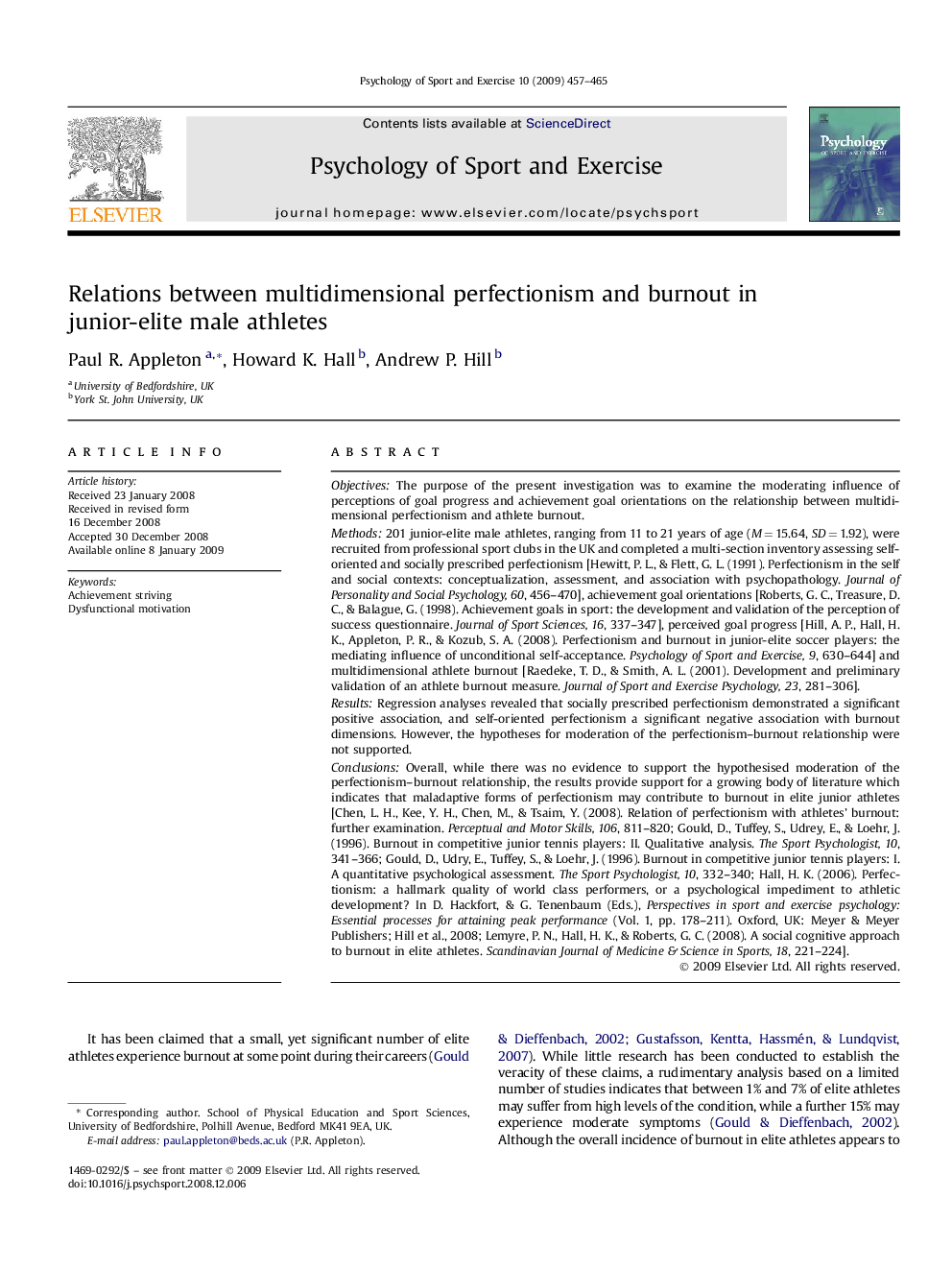| کد مقاله | کد نشریه | سال انتشار | مقاله انگلیسی | نسخه تمام متن |
|---|---|---|---|---|
| 894792 | 1472146 | 2009 | 9 صفحه PDF | دانلود رایگان |

ObjectivesThe purpose of the present investigation was to examine the moderating influence of perceptions of goal progress and achievement goal orientations on the relationship between multidimensional perfectionism and athlete burnout.Methods201 junior-elite male athletes, ranging from 11 to 21 years of age (M = 15.64, SD = 1.92), were recruited from professional sport clubs in the UK and completed a multi-section inventory assessing self-oriented and socially prescribed perfectionism [Hewitt, P. L., & Flett, G. L. (1991). Perfectionism in the self and social contexts: conceptualization, assessment, and association with psychopathology. Journal of Personality and Social Psychology, 60, 456–470], achievement goal orientations [Roberts, G. C., Treasure, D. C., & Balague, G. (1998). Achievement goals in sport: the development and validation of the perception of success questionnaire. Journal of Sport Sciences, 16, 337–347], perceived goal progress [Hill, A. P., Hall, H. K., Appleton, P. R., & Kozub, S. A. (2008). Perfectionism and burnout in junior-elite soccer players: the mediating influence of unconditional self-acceptance. Psychology of Sport and Exercise, 9, 630–644] and multidimensional athlete burnout [Raedeke, T. D., & Smith, A. L. (2001). Development and preliminary validation of an athlete burnout measure. Journal of Sport and Exercise Psychology, 23, 281–306].ResultsRegression analyses revealed that socially prescribed perfectionism demonstrated a significant positive association, and self-oriented perfectionism a significant negative association with burnout dimensions. However, the hypotheses for moderation of the perfectionism–burnout relationship were not supported.ConclusionsOverall, while there was no evidence to support the hypothesised moderation of the perfectionism–burnout relationship, the results provide support for a growing body of literature which indicates that maladaptive forms of perfectionism may contribute to burnout in elite junior athletes [Chen, L. H., Kee, Y. H., Chen, M., & Tsaim, Y. (2008). Relation of perfectionism with athletes' burnout: further examination. Perceptual and Motor Skills, 106, 811–820; Gould, D., Tuffey, S., Udrey, E., & Loehr, J. (1996). Burnout in competitive junior tennis players: II. Qualitative analysis. The Sport Psychologist, 10, 341–366; Gould, D., Udry, E., Tuffey, S., & Loehr, J. (1996). Burnout in competitive junior tennis players: I. A quantitative psychological assessment. The Sport Psychologist, 10, 332–340; Hall, H. K. (2006). Perfectionism: a hallmark quality of world class performers, or a psychological impediment to athletic development? In D. Hackfort, & G. Tenenbaum (Eds.), Perspectives in sport and exercise psychology: Essential processes for attaining peak performance (Vol. 1, pp. 178–211). Oxford, UK: Meyer & Meyer Publishers; Hill et al., 2008; Lemyre, P. N., Hall, H. K., & Roberts, G. C. (2008). A social cognitive approach to burnout in elite athletes. Scandinavian Journal of Medicine & Science in Sports, 18, 221–224].
Journal: Psychology of Sport and Exercise - Volume 10, Issue 4, July 2009, Pages 457–465